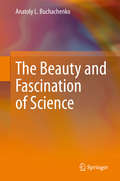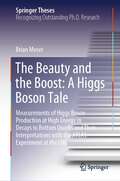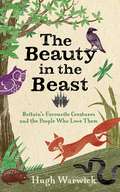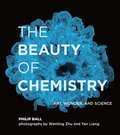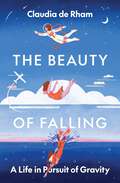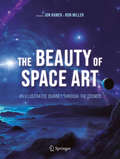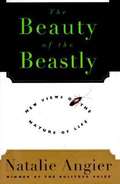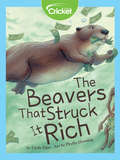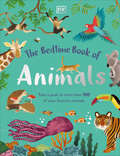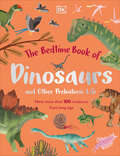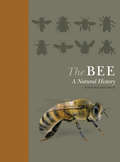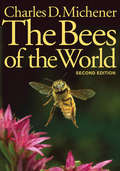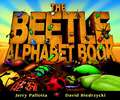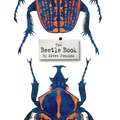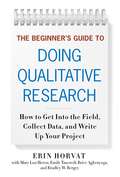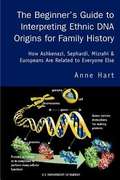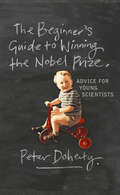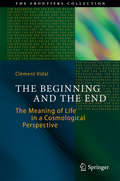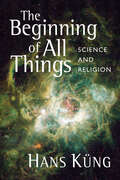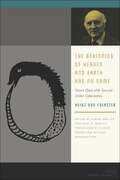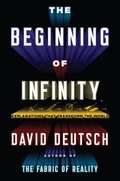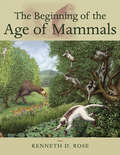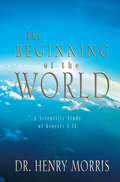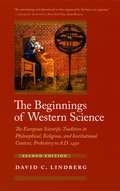- Table View
- List View
The Beauty and Fascination of Science
by Anatoly L. BuchachenkoIn this book, Professor Anatoly Buchachenko gives a brief and informative description of the most striking achievements and discoveries made in the major natural sciences at the turn of the century – in the late twentieth and early twenty-first centuries. The author has a rare ability to describe scientific discoveries so that these achievements and their significance are understandable not only by professionals and scientists of all specialities, but for any reader interested in modern science, its role in the existence of mankind, and its impact on human society. Originally published in Russian, Professor Buchachenko’s book describes the interaction of natural sciences with social ones—philosophy and history—as well as the part played by the human factor in the development of science, especially the role of the great scientists.
The Beauty and the Boost: Measurements of Higgs Boson Production at High Energy in Decays to Bottom Quarks and Their Interpretations with the ATLAS Experiment at the LHC (Springer Theses)
by Brian MoserPrecision measurements of the Higgs boson’s properties are a powerful tool to look for deviations from the predictions of the Standard Model (SM) of particle physics. The 139/fb of proton-proton collision data which have been collected by the ATLAS experiment during Run 2 of the LHC, offer an opportunity to investigate rare Higgs-boson topologies, which are particularly sensitive to new physics scenarios but experimentally difficult to access. Several such measurements, which target Higgs-boson decays to heavy-flavour quarks, as well as their combinations are presented in this thesis. A novel analysis that measures Higgs-boson production in association with a heavy vector boson V (VH, with V=W,Z) at high energies is presented. Dedicated Higgs-boson reconstruction techniques are applied to reconstruct the highly Lorentz-boosted Higgs-boson decays into pairs of bottom quarks. The measurement is subsequently combined with a VH cross-section measurement at low and intermediate pT(V) to provide a differential cross-section measurement in kinematic fiducial volumes over the largest possible pT(V) range. All cross-section measurements agree with the SM predictions within relative uncertainties that range from 30% to 300%. The results are furthermore interpreted as limits on the parameters of a SM effective field theory. Finally, a combination of measurements of Higgs decays to heavy-flavour quarks is used to experimentally determine that the Higgs-boson coupling to charm quarks is weaker than to bottom quarks, as predicted by the SM. The target audience for the thesis are physicists and physics students, in particular those with a background in high energy physics.
The Beauty in the Beast: Britain's Favourite Creatures and the People Who Love Them
by Hugh WarwickA delightful portrait of some of the UK's best-loved wild animals and birds and the colourful enthusiasts who champion their causes.
The Beauty of Chemistry: Art, Wonder, and Science
by Philip BallImages and text capture the astonishing beauty of the chemical processes that create snowflakes, bubbles, flames, and other wonders of nature.Chemistry is not just about microscopic atoms doing inscrutable things; it is the process that makes flowers and galaxies. We rely on it for bread-baking, vegetable-growing, and producing the materials of daily life. In stunning images and illuminating text, this book captures chemistry as it unfolds. Using such techniques as microphotography, time-lapse photography, and infrared thermal imaging, The Beauty of Chemistry shows us how chemistry underpins the formation of snowflakes, the science of champagne, the colors of flowers, and other wonders of nature and technology. We see the marvelous configurations of chemical gardens; the amazing transformations of evaporation, distillation, and precipitation; heat made visible; and more.
The Beauty of Falling: A Life in Pursuit of Gravity
by Claudia de RhamA world-renowned physicist seeks gravity&’s true nature and finds wisdom in embracing its force in her lifeClaudia de Rham has been playing with gravity her entire life. As a diver, experimenting with her body&’s buoyancy in the Indian Ocean. As a pilot, soaring over Canadian waterfalls on dark mornings before beginning her daily scientific research. As an astronaut candidate, dreaming of the experience of flying free from Earth&’s pull. And as a physicist, discovering new sides to gravity&’s irresistible personality by exploring the limits of Einstein&’s general theory of relativity. In The Beauty of Falling, de Rham shares captivating stories about her quest to gain intimacy with gravity, to understand both its feeling and fundamental nature. Her life&’s pursuit led her from a twist of fate that snatched away her dream of becoming an astronaut to an exhilarating breakthrough at the very frontiers of gravitational physics.While many of us presume to know gravity quite well, the brightest scientists in history have yet to fully answer the simple question: what exactly is gravity? De Rham reveals how great minds—from Newton and Einstein to Stephen Hawking, Andrea Ghez, and Roger Penrose—led her to the edge of knowledge about this fundamental force. She found hints of a hidden side to gravity at the particle level where Einstein&’s theory breaks down, leading her to develop a new theory of &“massive gravity.&” De Rham shares how her life&’s path turned from a precipitous fall to an exquisite flight toward the discovery of something entirely new about our surprising, gravity-driven universe.
The Beauty of Space Art: An Illustrated Journey Through the Cosmos
by Ron Miller Jon RamerLong before humans wrote, we painted.From mud and ash to acrylic and computers, artists across the centuries have found countless inventive ways to explore and express some of life’s biggest mysteries. Enter space art, a genre of artistic expression that strives to capture the wonders of our universe. This lavishly illustrated book chronicles the remarkable development of space art from a fledgling theme to a modern movement.In Part I, we traverse the history of art and astronomy from ancient times, through the Industrial Revolution, and into the 20th-century Space Age. Part II delves into the diverse techniques and subgenres of space art, where you will learn about things like rocks and balls, hardware art, and cosmic expressionism. Along the way, we’ll stop at places where neither humans nor spacecraft can easily go, from the scorching surface of Venus and the radiation-soaked volcanoes of Io to the alien terrain of exoplanets and the depths of distant galaxies.Featuring hundreds of original color images from space artists and astronomers alike, this book is a vivid visual story about the power of art, astronomy, and human curiosity. A heavily revised edition of the original Beauty of Space, it will entertain, educate, and inspire anybody who yearns to make sense of the strange and surreal sights in our universe.
The Beauty of the Beastly: New Views on the Nature of Life
by Natalie AngierNatalie Angier, one of the foremost American science writers, is the author of the masterly book "Natural Obsessions: The Search for the Oncogene (1988)". Now, in "The Beauty of the Beastly", she has reshaped many of her daily and weekly articles into a narrative that vividly conveys the discoveries of contemporary biological science and how biologists made them. She has arranged her topics according to the energy from which they spring - the life forces that inform and energize her (and our) work. To Angier, the movement, the dance, the play of life supplies the heartbeat of knowledge. In seven sections entitled, in order: Loving, Dancing, Slithering, Adapting, Healing, Creating, and Dying; Angier focuses on what science knows about the living world, in her own witty and exalted language.
The Beavers That Struck It Rich
by Linda ZajacWhat good is money to a beaver? In this amazing yet true story, wild beavers build their dam using stolen money that was discard into a creek. While the authorities scoured the area for the cash, the beavers incorporated the bills into their dam.
The Bedtime Book of Animals (The Bedtime Books)
by DKA must-have illustrated introduction to the animal kingdom, including over 50 of the world&’s favorite animals! Introducing The Bedtime Book of Animals, a must-have animal reference book for all early readers who are keen to explore animals from all over the globe. Turn each page to find out more about a wide variety of animals, from teeny-tiny insects to gigantic elephants and whales. The Bedtime Book of Animals showcases creatures from each of the core animal groups (mammals, birds, reptiles, amphibians, fish, and invertebrates) in six dedicated chapters. Many pages are devoted to a different creature, with others featuring a collection of animals from the same family, and some explore more than one animal type, giving bite-sized chunks of accessible information to help early learners get to know new species.A fun-filled journey into the animal kingdom awaits you, promising: - A must-have introduction to a wide variety of animals from around the world- Introduces essential information about each species in a friendly, accessible way- Colorfully illustrated, with light annotation of key features- Reinforces early animal vocabulary, and builds awareness of connections in the animal kingdom- Fully illustrated, with a bright color palette and fresh feel. From rabbits and red pandas, starfish to songbirds, The Bedtime Book of Animals is a beautiful, fully-illustrated and, engaging picture book with read-alout text– perfect for parents/carers and children to enjoy at bedtime. A must-have volume to add to every 3-5 year old&’s library, this is a one-hit introduction to animals, featuring more than 50 best-loved and lesser-known animals from around the world. Did you know that the topic of animals is universally popular and this is a tried-and-tested non-fiction genre, which can help to develop early understanding of the natural world in young readers, as well as develop soft skills such as empathy, kindness and care in 3-5-year-olds? Perfect for parents and educators seeking to introduce core animal knowledge at a young age, including how to recognize animals, animal categorization and key features. A friendly, factual, timeless gift book, The Bedtime Book of Animals will be treasured forever.
The Bedtime Book of Dinosaurs and Other Prehistoric Life: Meet More Than 100 Creatures From Long Ago (The Bedtime Books)
by Dean LomaxGet to know more than 100 of the world&’s favorite dinosaurs and other prehistoric life forms with this essential illustrated introduction.This must-have first book on dinosaurs and other ancient creatures is filled with beautiful illustrations and storybook text on every page, perfect for early readers who want to know more about the life that once roamed our planet. The Bedtime Book of Dinosaurs and other Prehistoric Life includes the earliest life that appeared in the ocean, to the giant dinosaurs, and the wonderfully weird mammals that followed them. Children aged 3-5 can discover a huge variety of organisms that are shown within the three chapters, which cover the Paleozoic, Mesozoic, and Cenozoic eras. With old favorites, such as Tyrannosaurus and Triceratops, as well as new discoveries, including Yi and Changmiania, there is something for every young fan of the primeval world.Inside the pages of this exciting dinosaur book, you&’ll find:- An introduction to the essential information about each prehistoric species in a friendly, accessible way.- Beautiful and accurate illustrations combined with introductory reference text about a wide variety of dinosaurs and other ancient plants and animals.- Engaging text for young children that can be read aloud – perfect for parents, carers, and children to enjoy at bedtime. - A one-hit introduction to prehistoric life, featuring more than 100 animals - an essential addition to every 3–5 year old&’s library.This exciting dinosaur guide helps to develop an early understanding of the prehistoric world for little ones and clearly explains the key features of each animal or plant, as well as how to say their names. A timeless gift book, this is a must-have for parents, carers, and educators who want to introduce core dinosaur knowledge at a young age in a fun and engaging way.
The Bee: A Natural History
by Noah Wilson-Rich Kelly Allin Norman Carreck Andrea QuigleyBees pollinate more than 130 fruit, vegetable, and seed crops that we rely on to survive. Bees are crucial to the reproduction and diversity of flowering plants, and the economic contributions of these irreplaceable insects measure in the tens of billions of dollars each year. Yet bees are dying at an alarming rate, threatening food supplies and ecosystems around the world. In this richly illustrated natural history of the bee, Noah Wilson-Rich and his team of bee experts provide a window into the vitally important role that bees play in the life of our planet. Earth is home to more than 20,000 bee species, from fluorescent-colored orchid bees and sweat bees to flower-nesting squash bees and leaf-cutter bees. This book takes an incomparable look at this astounding diversity, blending an engaging narrative with practical, hands-on discussions of such topics as beekeeping and bee health. It explores our relationship with the bee over evolutionary time, delving into how it came to be, where it stands today, and what the future holds for humanity and bees alike. Provides an accessible, illustrated look at the human-bee relationship over time Features a section on beekeeping and handy go-to guides to the identification, prevention, and treatment of honey bee diseases Covers bee evolution, ecology, genetics, and physiology Includes a directory of notable bee species Presents a holistic approach to bee health, including organic and integrated pest management techniques Shows what you can do to help bee populations
The Bees of the World
by Charles D. MichenerIn this extensive update of his definitive reference, Charles D. Michener reveals a diverse fauna that numbers more than 17,000 species and ranges from the common honeybee to rare bees that feed on the pollen of a single type of plant. With many new facts, reclassifications, and revisions, the second edition of The Bees of the World provides the most comprehensive treatment of the 1,200 genera and subgenera of the Apiformes. Included are hundreds of updated citations to work published since the appearance of the first edition and a new set of plates of fossil bees.The book begins with extensive introductory sections that include bee evolution, classification of the various bee families, the coevolution of bees and flowering plants, nesting behavior, differences between solitary and social bees, and the anatomy of these amazing insects. Drawing on modern studies and evidence from the fossil record, Michener reveals what the ancestral bee—the protobee—might have looked like. He also cites the major literature on bee biology and describes the need for further research on the systematics and natural history of bees, including their importance as pollinators of crops and natural vegetation. The greater part of the work consists of an unprecedented treatment of bee systematics, with keys for identification to the subgenus level. For each genus and subgenus, Michener includes a brief natural history describing geographical range, number of species, and noteworthy information pertaining to nesting or floral biology.The book is beautifully illustrated with more than 500 drawings and photographs that depict behavior, detailed morphology, and ecology. Accented with color plates of select bees, The Bees of the World will continue to be the world's best reference on these diverse insects.
The Beetle Alphabet Book (Jerry Pallotta's Alphabet Books)
by Jerry PallottaLearn your beetles from A to Z as they crawl their way through the alphabet. Get to know the most diverse species on earth in this entertaining and informative nature ABC book. From the Dung Beetle to the Kalahari Beetle to the Zinc Metallic Beetles, the book is both fact-filled and fun for young readers. Full of Jerry Pallotta's signature humor and brought to life with bold artwork by award-winning illustrator, David Biedrzycki. A great introduction for the insect-enthused and lovers of all things that creep and crawl.
The Beetle Book
by Steve JenkinsBeetles squeak and beetles glow. Beetles stink, beetles sprint, beetles walk on water. With legs, antennae, horns, beautiful shells, knobs, and other oddities--what's not to like about beetles? The beetle world is vast: one out of every four living things on earth is a beetle. There are over 350,000 different species named so far and scientists suspect there may be as many as a million. From the goliath beetle that weighs one fourth of a pound to the nine inch long titan beetle, award-winning author-illustrator Steve Jenkins presents a fascinating array of these intriguing insects and the many amazing adaptations they have made to survive.
The Beginner's Guide to Doing Qualitative Research
by Erin Horvat Mary Lou Heron Emily Tancredi-Brice Agbenyega Bradley W. BergeyDesigned for aspiring ethnographers and qualitative researchers, this book is organized into three parts that addresses the key phases of any ethnographic project: beginning a project, collecting data in the field, and analysing data and writing about your study.
The Beginner's Guide to Interpreting Ethnic DNA Origins for Family History: How Ashkenazi, Sephardi, Mizrahi & Europeans are Related to Everyone Else
by Anne HartAre you Curious About Your Ethnic Family Origins from Last Century Back 10,000 Years? Genealogists are now using molecular genealogy-comparing and matching people by matrilineal DNA lineages-- mtDNA or patrilineal Y-chromosome ancestry and/or racial percentages tests. Here's how to trace your DNA test results for family history, oral history, ancestry, molecular genealogy, and more. How to find your DNA matches in online DNA databases.
The Beginner's Guide to Winning the Nobel Prize: Advice for Young Scientists
by Peter DohertyIn The Beginner's Guide to Winning the Nobel Prize, Doherty recounts his unlikely path to becoming a Nobel Laureate. Beginning with his humble origins in Australia, he tells how he developed an interest in immunology and describes his award-winning, influential work with Rolf Zinkernagel on T-cells and the nature of immune defense. In prose that is at turns amusing and astute, Doherty reveals how his nonconformist upbringing, sense of being an outsider, and search for different perspectives have shaped his life and work.Doherty offers a rare, insider's look at the realities of being a research scientist. He lucidly explains his own scientific work and how research projects are selected, funded, and organized; the major problems science is trying to solve; and the rewards and pitfalls of a career in scientific research. For Doherty, science still plays an important role in improving the world, and he argues that scientists need to do a better job of making their work more accessible to the public. Throughout the book, Doherty explores the stories of past Nobel winners and considers some of the crucial scientific debates of our time, including the safety of genetically modified foods and the tensions between science and religion. He concludes with some "tips" on how to win a Nobel Prize, including advice on being persistent, generous, and culturally aware, and he stresses the value of evidence. The Beginner's Guide to Winning the Noble Prize is essential reading for anyone interested in a career in science.
The Beginner's Guide to Winning the Nobel Prize: Advice for Young Scientists
by Peter DohertyThe Nobel Prize-winning medical researcher recounts his unlikely career journey in a memoir that &“opens the vault to the world of science&” (Nature). Beginning with his humble origins in Australia, Peter Doherty tells how he developed an interest in immunology and describes his award-winning, influential work with Rolf Zinkernagel on T-cells and the nature of immune defense. In prose that is both amusing and astute, Doherty reveals how his nonconformist upbringing and search for different perspectives have shaped his life and work. Doherty offers an insider's look at the life of a research scientist. He lucidly explains his own scientific work and how research projects are selected, funded, and organized; the major problems science is trying to solve; and the rewards and pitfalls of a career in scientific research. He also explores the stories of past Nobel winners and considers some of the crucial scientific debates of our time, including the safety of genetically modified foods and the tensions between science and religion. He concludes with some "tips" on how to win a Nobel Prize, including advice on being persistent, generous, and culturally aware.
The Beginning and the End
by Clément VidalIn this fascinating journey to the edge of science, Vidal takes on big philosophical questions: Does our universe have a beginning and an end or is it cyclic? Are we alone in the universe? What is the role of intelligent life, if any, in cosmic evolution? Grounded in science and committed to philosophical rigor, this book presents an evolutionary worldview where the rise of intelligent life is not an accident, but may well be the key to unlocking the universe's deepest mysteries. Vidal shows how the fine-tuning controversy can be advanced with computer simulations. He also explores whether natural or artificial selection could hold on a cosmic scale. In perhaps his boldest hypothesis, he argues that signs of advanced extraterrestrial civilizations are already present in our astrophysical data. His conclusions invite us to see the meaning of life, evolution and intelligence from a novel cosmological framework that should stir debate for years to come.
The Beginning of All Things: Science and Religion
by Hans KüngTranslated by John Bowden In an age when faith and science seem constantly to clash, can theologians and scientists come to a meeting of minds? Yes, maintains the intrepid Hans Küng, as he brilliantly argues here that religion and science are not mutually exclusive but complementary. Focusing on beginnings -- beginnings of time, of the world, of man, of human will -- Küng deals with an array of scientific precepts and teachings. From a unified field theory to quantum physics to the Big Bang to the theory of relativity -- even superstring and chaos theories -- he examines all of the theories regarding the beginning of the universe and life (of all kinds) in that universe. Küng seeks to reconcile theology with the latest scientific insights, holding that "a confrontational model for the relationship between science and theology is out of date, whether put forward by fundamentalist believers and theologians or by rationalistic scientists and philosophers." While accepting evolution as scientists generally describe it, he still maintains a role for God in founding the laws of nature by which life evolved and in facilitating the adventure of creation. Exhibiting little patience for scientists who do not see beyond the limits of their discipline or for believers who try to tell experts how things must have been, Küng challenges readers to think more deeply about the beginnings in order to facilitate a new beginning in dialogue and understanding.
The Beginning of Heaven and Earth Has No Name: Seven Days with Second-Order Cybernetics (Meaning Systems)
by Heinz von FoersterHeinz von Foerster was the inventor of second-order cybernetics, which recognizes the investigator as part of the system he is investigating. The Beginning of Heaven and Earth Has No Name provides an accessible, nonmathematical, and comprehensive overview of von Foerster’s cybernetic ideas and of the philosophy latent within them. It distills concepts scattered across the lifework of this scientific polymath and influential interdisciplinarian. At the same time, as a book-length interview, it does justice to von Foerster’s élan as a speaker and improviser, his skill as a raconteur.Developed from a week-long conversation between the editors and von Foerster near the end of his life, this work playfully engages von Foerster in developing the difference his notion of second-order cybernetics makes for topics ranging from emergence, life, order, and thermodynamics to observation, recursion, cognition, perception, memory, and communication.The book gives an English-speaking audience a new ease of access to the rich thought and generous spirit of this remarkable and protean thinker.
The Beginning of Infinity
by David DeutschOld ways of thought permitted no process such as science for correcting errors and misconceptions. So ideas were static for long periods. Being bad explanations, even the best of them typically had little reach and were therefore brittle and unreliable beyond, and often within, their traditional applications. When ideas did change, it was seldom for the better, and when it did happen to be for the better, that seldom increased their reach. The emergence of science, and more broadly what I am calling the Enlightenment, was the beginning of the end of such static, parochial systems of ideas. It initiated the present era in human history, unique for its sustained, rapid creation of knowledge with ever-increasing reach. Many have wondered how long this can continue. Is it inherently bounded? Or is this the beginning of infinity - that is to say, do these methods have unlimited potential to create further knowledge?'Science has never had an advocate quite like David Deutsch. He is a computational physicist on a par with his touchstones Alan Turing and Richard Feynman, and also a philosopher in the line of his greatest hero, Karl Popper. His arguments are so clear that to read him is to experience the thrill of the highest level of discourse available on this planet and to understand it . . . This is the great Life, the Universe and Everything book for our time and the answer is not 42: it is infinity. To understand precisely what Deutsch means by this, you will have to read him. Do so and lose your parochial blinkers forever. ' Independent
The Beginning of the Age of Mammals
by Kenneth D. RoseIn the tradition of G. G. Simpson's classic work, Kenneth D. Rose's The Beginning of the Age of Mammals analyzes the events that occurred directly before and after the mysterious K-T boundary which so quickly thrust mammals from obscurity to planetary dominance. Rose surveys the evolution of mammals, beginning with their origin from cynodont therapsids in the Mesozoic, contemporary with dinosaurs, through the early Cenozoic, with emphasis on the Paleocene and Eocene adaptive radiations of therian mammals. Focusing on the fossil record, he presents the anatomical evidence used to interpret behavior and phylogenetic relationships. The life's work of one of the most knowledgeable researchers in the field, this richly illustrated, magisterial book combines sound scientific principles and meticulous research and belongs on the shelf of every paleontologist and mammalogist.
The Beginning of the World
by Dr Henry M. MorrisA handy study of Genesis 1-11, this book gives insightful commentary into the stories most often labeled as "myth" by those who want to chip away at the Bible. Morris details amazing evidence that the first 11 chapters of Genesis are literal history that shapes us today.
The Beginnings of Western Science: The European Scientific Tradition in Philosophical, Religious, and Institutional Context, Prehistory to A.D. 1450 (2nd edition)
by David C. LindbergWhen it was first published in 1992, The Beginnings of Western Science was lauded as the first successful attempt ever to present a unified account of both ancient and medieval science in a single volume. Chronicling the development of scientific ideas, practices, and institutions from pre-Socratic Greek philosophy to late-Medieval scholasticism, David C. Lindberg surveyed all the most important themes in the history of science, including developments in cosmology, astronomy, mechanics, optics, alchemy, natural history, and medicine. In addition, he offered an illuminating account of the transmission of Greek science to medieval Islam and subsequently to medieval Europe. Beginnings of Western Science was, and remains, a landmark in the history of science, shaping the way students and scholars understand these critically formative periods of scientific development. It reemerges here in a second edition that includes revisions on nearly every page, as well as several sections that have been completely rewritten. For example, the section on Islamic science has been thoroughly retooled to reveal the magnitude and sophistication of medieval Muslim scientific achievement. And the book now reflects a sharper awareness of the importance of Mesopotamian science for the development of Greek astronomy. In all, the second edition of The Beginnings of Western Science captures the current state of our understanding of more than two millennia of science and promises to continue to inspire both students and general readers.
